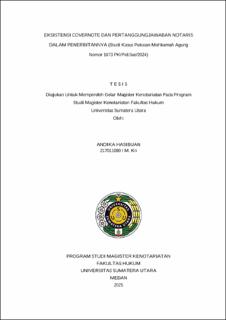| dc.description.abstract | The issuance of covernote by notaries in banking transactions has become a common practice in Indonesia, even though this legal instrument is not explicitly regulated under statutory provisions. The case reflected in Supreme Court Decision No. 1673 PK/Pid.Sus/2024 highlights the misuse of covernotes, resulting in financial losses for the bank and raising questions about the scope of notary accountability in their inssuance. The research problems addressed include: the legal status of covernotes according to the Law on Notary Positions (UUJN), the linkage between covernotes issued by a notary and the involvement of the notary in alleged corruption, and the accountability of Notary E in the issuance of covernotes alongside the legal considerations by judges in convicting Notary E of corruption.
This normative juridical research examines the existence of covernotes in notarial regulations through legislative and case approaches. Primary, secondary, and non-legal materials were collected through literature studies and analyzed deductively to provide solutions to the research problems.
The study concludes are not explicitly regulated under the UUJN but have evolved as living law in banking practices. In the case of Notary E, the issuance of covernotes that did not reflect actual circumstances, resulting in non-performing loans at a state-owned bank, caused states losses. The legal proceedings experienced significant dynamics, with sentencing ranging from 1.5 years (District Court), 2 years (High Court), 8 years (Supreme Court), to a reduced sentence of 2 years and 8 months upon judicial review. This reduction was based on the consideration that the defendant acted merely as an assistant, as the credit disbursement decision rested with the bank, and the defendant did not directly benefit financially. | en_US |


